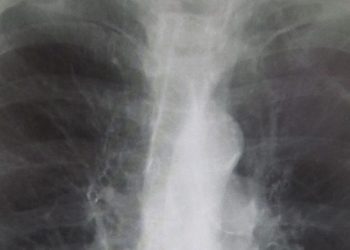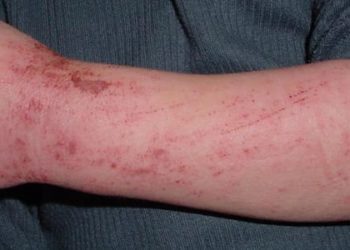The ONTT: Intravenous steroids lead to faster visual recovery in optic neuritis [Classics Series]
1. In patients with first presentation of optic neuritis, treatment with intravenous methylprednisolone followed by oral prednisone resulted in faster visual recovery when compared to placebo, though only a small benefit persisted by 6 months.
2. The use of oral prednisone alone demonstrated no benefit in terms of visual recovery and appeared to increase the risk of recurrent episodes of optic neuritis compared to placebo.
Original Date of Publication: February 1992
Study Rundown: Optic neuritis is an inflammatory condition affecting the optic nerve and is most commonly associated with multiple sclerosis (MS). Clinically, it can present with a wide range of impairment in visual acuity, color vision, contrast sensitivity, and/or visual fields. In the 1990s, both ophthalmologists and neurologists were commonly using oral steroids to treat optic neuritis, though oral and intravenous steroid regimens had not yet been evaluated in a randomized controlled trial.
The Optic Neuritis Treatment Trial (ONTT) compared the effectiveness and safety of different steroid regimens in treating optic neuritis. The study found that intravenous methylprednisolone followed by oral prednisone hastened the rate of visual recovery in optic neuritis compared to placebo, with some improvement in vision noted at 6 months after treatment. Use of oral prednisone alone was shown to have no benefit compared to placebo, though it did lead to significantly higher rates of recurrent optic neuritis. Since the publication of the ONTT, subsequent studies have found that intravenous steroids do accelerate visual recovery in optic neuritis, though there were no differences in long-term visual outcomes.
Click to read the study in NEJM
In-Depth [randomized controlled trial]: This open-label, randomized trial recruited patients between 18-46 years of age with acute unilateral optic neuritis with visual symptoms lasting ≤8 days, a relative afferent pupillary defect (RAPD), and visual field defect in the affected eye. Exclusion criteria included previous optic neuritis in the same eye or evidence of a systemic disease, other than MS, that could cause optic neuritis. A total of 457 patients were randomized to either i) intravenous methylprednisolone 250 mg q6h for 3 days followed by oral prednisone 1 mg/kg for 11 days, ii) oral prednisone 1 mg/kg for 14 days, or 3) placebo. Steroid treatment was followed by a short oral taper. Patients were followed for 24 months. The primary outcomes were visual fields and contrast sensitivity measured at 6 months.
Patients treated with methylprednisolone had a higher rate of return to normal vision in visual fields (p = 0.0001) and contrast sensitivity (p = 0.02), with a trend towards improved visual acuity (p = 0.09) compared to placebo. At 6 months, patients in the methylprednisolone group experienced better contrast sensitivity (p = 0.026) and color vision (p = 0.033), with no differences noted in visual acuity (p = 0.664). There were no significant differences in the rates of recovery for oral prednisone patients compared to placebo in all measures of vision (p > 0.05). By 24 months, 20 (13%) patients in the methylprednisolone group, 42 (27%) patients in the oral prednisone group, and 24 (15%) patients in the placebo group had experienced ≥1 new episode of optic neuritis. The oral prednisone group had a higher rate of new episodes of optic neuritis compared with placebo (RR 1.79, 95%CI 1.08-2.95).
Image: PD
©2017 2 Minute Medicine, Inc. All rights reserved. No works may be reproduced without expressed written consent from 2 Minute Medicine, Inc. Inquire about licensing here. No article should be construed as medical advice and is not intended as such by the authors or by 2 Minute Medicine, Inc.







